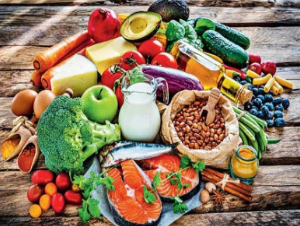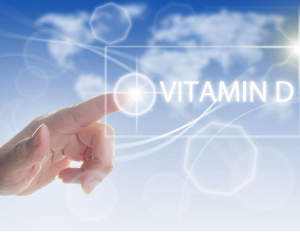Vitamins are nutrients your body needs to function and fight disease. Your body can’t make vitamins on its own, so you have to get them through the food you eat or, in some cases, supplements. 13 vitamins are essential for your body to function properly. Knowing the different types and the purpose of these vitamins is important for good health.

Different types of Vitamins
- Fat-soluble vitamins– Fat-soluble vitamins are dissolved in fat. They are absorbed by fat globules that travel through the small intestine and are distributed throughout the body in the bloodstream. Unlike water-soluble vitamins, excess fat-soluble vitamins are stored in the liver and adipose (adipose) tissues for future use. They are most abundant in foods high in fat and are better absorbed when eaten with fat.
- Vitamin A- vitamin A is a fat-soluble nutrient that plays a vital role in the body. It occurs naturally in foods and can also be consumed through supplements. Although vitamin A is often thought of as a single nutrient, it is a group of fat-soluble compounds, including retinol, retinal, and retinyl esters. To use both of these forms of vitamin A, your body must convert them into retinal and retinoic acid, the active forms of the vitamin. Vitamin A is essential for health as it promotes cell growth, immune function, fetal development, and vision. vitamin A positively affects health by keeping oxidative stress under control, strengthening your immune system, and protecting against certain diseases. Its deficiency can lead to blindness, increased risk of infections, pregnancy complications, and skin problems. Preformed vitamin A exists in animal foods such as liver, salmon, and egg yolks, while provitamin A carotenoids are found in plant foods, including sweet potatoes, cabbage, and carrots.
- Vitamin D– Vitamin D is a fat-soluble vitamin from a group of compounds that includes vitamins D1, D2, and D3. Our body produces vitamin D naturally when it is directly exposed to sunlight. We also get vitamin D from certain foods and supplements to ensure adequate levels of the vitamin in our blood. Vitamin D has several important functions. Perhaps the most important is the regulation of calcium and phosphorus absorption and facilitating normal immune system function. vitamin D has many potential benefits. It can reduce the risk of certain diseases, help improve mood and reduce symptoms of depression and help with weight management.

- Vitamin E- Vitamin E occurs naturally in certain foods, including seeds, nuts, vegetables, and fortified products. Vitamin E capsules can be used as a dietary supplement. It plays many roles in our bodies. It is perhaps best known for its antioxidant effects, protecting your cells from oxidative damage by neutralizing harmful molecules called free radicals. In addition, it is required for proper immune function and cell signaling. Since they are naturally fat-soluble, these vitamins are stored in the body’s fatty tissues and therefore do not need to be taken regularly.
- Vitamin K- Vitamin K is a compound divided into K1 (phylloquinone) and K2 (menaquinone). Vitamin K1, the widespread form, is formed mainly in plant foods, particularly dark leafy vegetables. K2, on the other hand, is only detected in animal and fermented plant foods. Vitamin K is a prominent nutrient that plays an active role in blood clotting and bone and heart health. While vitamin K deficiency is rare, suboptimal intake can harm your health over time. Insufficient intake can impair blood clotting, weaken bones, and increase the threat of heart disease.
- Water-soluble vitamins– Water-soluble vitamins (unlike fat-soluble vitamins) are not stored in the body, it absorbs what it needs and usually excrete the excess with urine. Since they cannot be stored, the body needs a continuous supply through the constant daily intake of the foods we eat, the supplements we take, or a combination of both.
- Vitamin C- Vitamin C is a water-soluble vitamin found in many foods, especially fruits and vegetables. It functions as a powerful antioxidant in the body and plays an important role in immune function, neurotransmitter production, collagen synthesis, and more. Getting enough vitamin C in your diet can help reduce the risk of common health conditions such as heart disease. In addition, vitamin C is vital for synthesizing collagen, connective tissue, bones, teeth, and small blood vessels. citrus fruits may be the most well-known source of vitamin C, a wide variety of fruits and vegetables are rich in this vitamin and can even exceed the amounts found in citrus fruits.

- Vitamin B- Vitamin B complex consists of eight B vitamins: B1 (thiamine), B2 (riboflavin), B3 (niacin), B5 (pantothenic acid), B6 (pyridoxine), B7 (biotin), B9 (folic acid), B12 (cobalamin). B vitamins play a crucial role in sustaining good health and well-being. As the building blocks of a healthy body, B vitamins directly affect our energy levels, brain function, and cellular metabolism.
Vitamin | Function |
Thiamin (B1) | Thiamin helps transform glucose into energy and has a role in nerve function. |
Riboflavin (B2) | Riboflavin is primarily involved in energy production and aids vision and skin health. |
Niacin (B3) | Niacin is necessary for the body to convert carbohydrates, fats, and alcohol into energy. |
Pantothenic acid (B5) | Pantothenic acid is needed for the metabolism of carbohydrates, proteins, fats, and alcohol, as well as for the production of red blood cells and steroid hormones. |
Pyridoxine (B6) | Pyridoxine is needed for protein and carbohydrate metabolism, red blood cell formation, and certain brain chemicals. |
Biotin (B7) | Biotin (B7) is required for energy metabolism, fat synthesis, amino acid metabolism, and glycogen synthesis. |
Folic acid (B9) | Folic acid (a synthetic form of folate widely used in dietary supplements and food fortification) is needed to make red blood cells, which carry oxygen in the body. |
Cyanocobalamin (B12) | Cyanocobalamin (or vitamin B12) helps produce and maintain myelin surrounding nerve cells, mental abilities, and red blood cell formation. |
Importance of Vitamins
Although vitamins are not used for energy production, they are essential for growth, reproduction, and maintenance. We need fat-soluble vitamins for normal color vision, blood clotting, bone formation, and other body functions. Most of the water-soluble ones are very necessary for the metabolism of carbohydrates, lipids, amino, etc. in our body, where they function as coenzymes or prosthetic groups of various enzymes. Some, such as vitamins A and D, are steroid hormones. Lack of fat-soluble vitamins causes night blindness, skeletal deformities, bleeding, and hemolysis. Although we need vitamins in small amounts, their deficiency causes many diseases. Therefore, it is crucial for our survival.
Sources of Vitamins-
The human body is designed to take what it needs from the food we eat and then expel the waste as excrement.
Below are the various kinds of vitamins along with their sources.
Vitamin A- Cheese, cream, butter, eggs, liver, leafy vegetables, pumpkin.
Vitamin D- Egg yolks, liver, fatty fish, fortified milk, Sunlight.
Vitamin E- Soybeans, corn, wholegrain products, liver, nuts, and seeds.
Vitamin K- Kale, spinach, broccoli, and collard greens.
Vitamin C- Citrus fruits, cabbage family, strawberries, peppers, tomatoes, potatoes, papayas, and mangoes.
Vitamin B1 (Thiamine)- Pork, whole grain, enriched breads, cereals, legumes, nuts and seeds
Vitamin B2 (Riboflavin)- Milk, whole grains, green leafy vegetables, and cereals.
Vitamin B3 (Niacin)- Meat, fish, whole grain, cereals, mushrooms, and peanut butter.
Vitamin B5 (Pantothenic acid) – Milk, eggs, cereals, and almost every food product.
Vitamin B6 (Pyridoxine)- Meat, fish, eggs, vegetables, fruits.
Vitamin B7 (Biotin)- Avocado, eggs, nuts, and seeds.
Vitamin B9 (Folic acid)- Green leafy vegetables, legumes, orange juices, liver.
Vitamin B12 (Cyanocobalamin)- Meat, fish, poultry, seafood, eggs, milk, and milk products.
Vitamins are a group of organic compounds. They occur naturally in plants and animals. They work in the same way as minerals, with the main difference being that minerals are inorganic substances that we get from the earth and water. A healthy balanced diet should provide all the vitamins we need. Still, supplements can help fill any nutritional gaps or restore low levels after illness or poor nutrition. If we don’t have enough vitamins, we can develop deficiencies. For example, vegans and some vegetarians are at risk of vitamin B12 deficiency because it is mainly found in animal foods. Also, too much vitamin A from food or supplements can lead to liver and bone damage and cause birth defects. Be sure to consult the doctor before including any vitamin supplements. It is also necessary to take them in the right amount because their lack or excessive intake can cause various complications.
By:- Humera Ansari
Date:- 07/11/2022

